When To Take The Cone Off Your Dog After Neutering
Most dogs, my own included, really dislike wearing a cone. And the chances are, you’ll be hoping to get rid of the cone as soon as possible after your dog’s neuter operation!
It’s important that your pooch doesn’t get a chance to chew on their wounds and potentially make the healing time take much longer. So, the cone, or an effective alternative, does need to stay on your dog until their wounds have healed. And that can take from 7-14 days.
Contents
- Is the cone really necessary?
- Is there an alternative?
- Are some types of cone better than others?
- Does my dog have to wear the cone all the time?
- Can I shorten the time that my dog has to wear the cone?
I’m going to talk about the factors that will influence how long your dog needs to wear their cone, and at the alternatives available to you. Because there are a few.

As always after a surgical procedure, the most important thing you need to do is follow your veterinarian’s instructions, and check with them first if you want to try out one of the alternative cones mentioned below.
Is The Cone Really Necessary?
When you collect your dog after an operation, they are often a bit drowsy for a while. They can seem vulnerable and a bit helpless. And the cone seems to make everything worse. No wonder your first instinct is to rip it off and toss the thing in the trash.
In addition, you may have heard that a dog’s saliva has healing properties and want your dog to be able to lick their wound clean.
However, it is a misconception that licking will always help a wound to heal. And unfortunately, there is a very real chance that your dog may chew out the stitches and break the wound open again.

So, some kind of wound protection system is essential if your dog is to make a quick and pain free recovery.
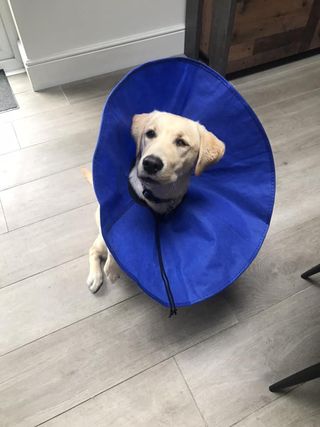
Most veterinarians recommend the plastic cone (also known as the Elizabethan collar, or Buster collar) as these work well, and are cheap and easy to fit. Your dog may be wearing one when you collect them to take them home.
That doesn’t mean you can’t change the cone for an alternative.
Is There An Alternative To The Cone Of Shame?
Although most dogs adapt quite quickly to wearing a cone, a study published in 2006 showed that these devices may have a negative welfare impact on some dogs and encouraged owners to explore alternatives.
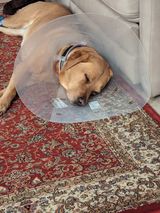
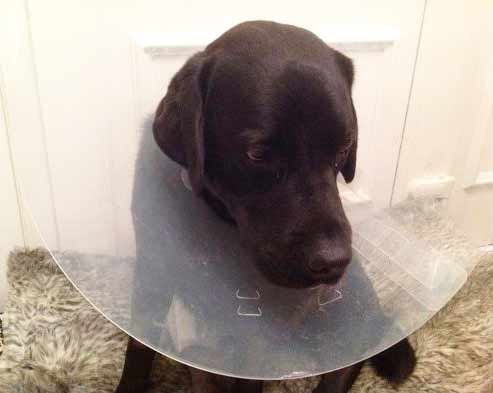
There are a couple of other ways to prevent dogs from chewing at their stitches or opening up a surgical incision.
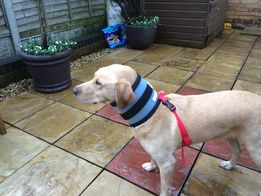
There are different types of neck collar, including inflatable ones, and there is also the option of medical apparel.
That’s not as fancy as it sounds. We’re talking about a stretchy garment which covers the area over the wound.
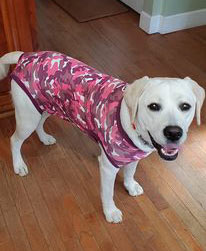
There are a few different brands selling medical pet shirts or recovery suits, and some pet owners have successfully adapted a t-shirt or other item of clothing.
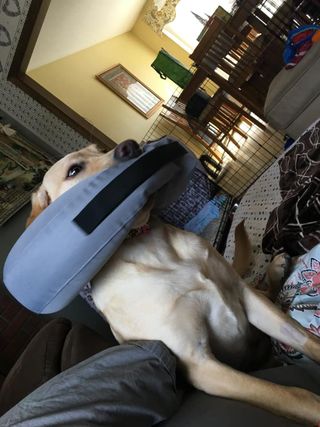
However, it’s important to be aware that some dogs are pretty good at chewing these and may even be able to remove them. So, it’s a good idea to have a chat with your veterinarian about the pros and cons before rushing out to purchase one.
Are Some Types Of Cone Better Than Others?
The basic plastic cone that many veterinarians provide is usually adequate, but some dogs do break these by banging their head against things, or trying to force their way through gaps where the cone won’t fit.
If that happens, your vet should be able to offer you a replacement or you can purchase one cheaply online. Sometimes moving down to a slightly smaller cone can reduce the problems.
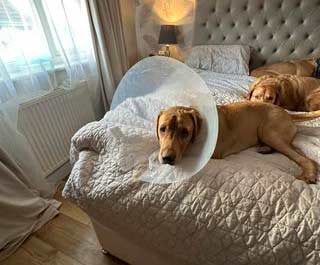
This gorgeous guy was smashing into everything including his owner’s legs until they switched to this smaller cone which still kept him protected.
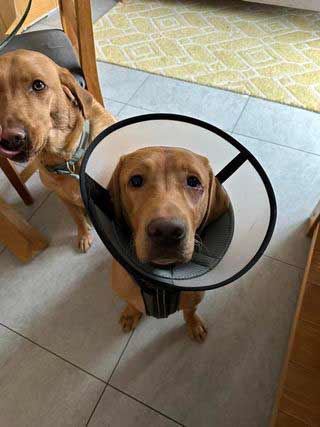
Some pet owners report that dogs seem more comfortable in soft cushioned, or inflatable collars and these can also be purchased from pet stores.
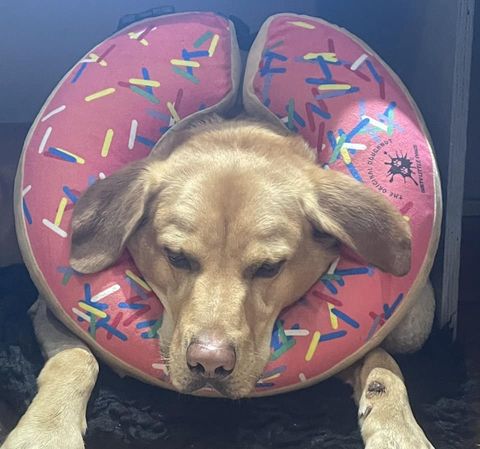
Does My Dog Have To Wear The Cone All The Time?
Some people like to remove the cone while their dog is eating. Especially if the dog’s appetite is depressed while they are wearing the cone.
However, if you remove the cone at any time it is vital that you remain with the dog throughout to make sure they do not poke at their wound. Do not leave them unsupervised at all.
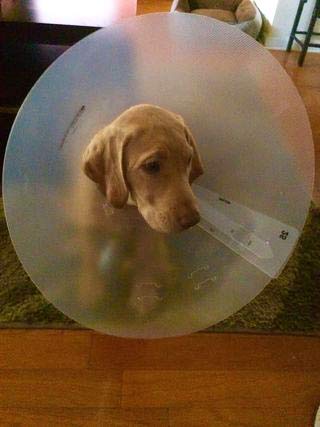
A dog can rip out their stitches in the time it takes you to answer the door, or put the trash out. Don’t take chances. If you need to take your eyes off the dog even for a moment, pop the cone back on again.
Can I Shorten The Time That My Dog Has To Wear The Cone?
Cones are a pain. Both for you and for your dog. But they are important and most dogs have to wear one at some point. The length of time that the dog needs to wear the cone depends on speed of healing. This is likely to take one to two weeks.
Preventing the dog from licking or chewing the wound will ensure that the dog heals as fast as possible.
Keeping the cone on the dog at all times, even during the night, and especially when you are not supervising closely, is the best way to achieve this.
You can also promote quick healing by following your veterinarians instructions for post operative care closely. If your dog is prescribed crate rest or restricted exercise, it’s because movement or activity may delay healing or even open the wound up again.
On The Mend
It can be very upsetting to see your friend stumbling around, bumping into things and trying to get the cone off. However, most dogs do get used to them very quickly, and they are a very effective way of protecting post operative wounds
It really is worthwhile sticking to veterinary advice that you have been given and keeping the cone in place until the healing process is complete
Your dog will soon be on the mend and you’ll be able to put the cone away and go back to life as normal.
I hope your dog makes a speedy recovery. And do let us know if you have found an extra comfortable type of cone or a great alternative that worked well for your dog.
References
- The Cone of Shame”: Welfare Implications of Elizabethan Collar Use on Dogs and Cats as Reported by their Owners”
- Dog Neuter Recovery – Pet MD
!


Free Labrador Updates!
Get my training tips, news, reviews, and the latest from The Labrador Site delivered to your inbox


